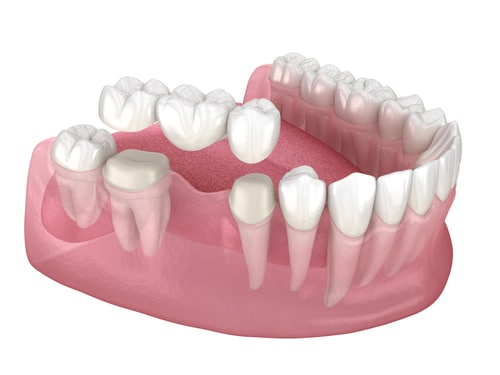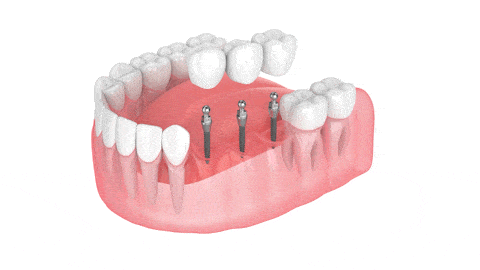Dental Bridge in Springfield, MO
Filling the gaps left by missing teeth is crucial for maintaining the appearance and function of your smile. Without a complete set of teeth, you may face challenges while chewing and speaking, experience shifting of the surrounding teeth, and risk losing jawbone density. Fortunately, a dental bridge provides a dependable fix for these problems by bridging the gaps in your smile!
At the Mini Dental Implant Center of America (MDICA) in Springfield, MO, our skilled and experienced dentists often utilize mini dental implants to secure dental bridges. As an MDICA, we are a part of an elite group of practices with extensive experience placing mini implants. Using these innovative implants to anchor your dental bridge, we can restore your smile!
What Is a Dental Bridge?
A dental bridge is a custom-made restoration that replaces one or more missing teeth in a row. Depending on the type of dental bridge used, they are either anchored securely to dental implants or neighboring teeth on either side of the gap.
Dental bridges consist of artificial teeth—known as pontics—fused together to create a row of replacement teeth. A dental bridge helps “bridge” the gap created by missing teeth and prevents common oral health issues that stem from tooth loss. Restoring your smile not only allows you to speak and chew more effectively, but it also stops your remaining teeth from shifting in your mouth.
Types of Dental Bridges
There are various types of dental bridges, each with its own distinct advantages. Whether you’re looking to preserve as much of your natural tooth structure as possible, seeking a durable solution, or searching for a more affordable option, there’s a dental bridge that fits every situation!
-

A traditional dental bridge uses crowns on either side for support, replacing one or more missing teeth in your smile. Traditional bridge: This bridge uses pontics, or artificial teeth, anchored by dental crowns to replace missing teeth. These crowns attach to the healthy teeth adjacent to the gap in your smile, using them to support the bridge restoration. This method offers strong and reliable support for everyday use, making it a popular choice for patients like you.
- Cantilever bridge: Similar to a traditional bridge, a cantilever bridge uses crowns on healthy teeth for support. However, a Cantilever bridge uses only one crown instead of two! These restorations are a suitable solution when you have only one healthy tooth available to support your bridge, as teeth suffering decay or infection can’t be used for support.
- Maryland bridge: Unlike traditional or cantilever bridges, which require filing down teeth to make space for the crowns, a Maryland bridge is a non-invasive alternative. Rather than using dental crowns, this bridge has a pontic with metal wings attached. We bond these wings to the back of your adjacent teeth, minimizing the need to alter their structure.
- Implant-supported bridge: An implant bridge utilizes dental implants for support, which we secure into your jawbone. Unlike other bridges that use adjacent teeth for support, implant-supported bridges don’t need to affect your surrounding teeth! In most cases, an implant bridge is considered the most secure bridge option.
A Closer Look at the Implant-Supported Bridge
At the MDICA in Springfield, MO, we prefer to use mini dental implants to secure restorations like a dental bridge. Because we anchor these implants directly to the jawbone, implant-supported bridges have a solid foundation without relying on surrounding teeth.
Dental implants are made from biocompatible titanium, which allows them to bond with the surrounding bone over time. This stability resembles the strength of your natural tooth roots, resulting in a strong and stable bite! The stability of titanium implants ensures enhanced support and longevity, significantly outperforming traditional dental bridges.
Additionally, implant-supported bridges contribute to long-term jaw health. Following tooth loss, your jawbone deteriorates due to a lack of stimulation from the tooth’s roots. Dental implants replace these roots, stimulating your jawbone every time you bite or chew. Stimulation is vital for maintaining jawbone health and preventing bone loss, supporting the bridge’s structural integrity, and contributing to the overall vitality of your jaw.
The Benefits of a Mini Implant-Supported Bridge

When you opt for mini dental implants to support your bridge, you’re choosing a solution that offers distinct advantages over more traditional implants.
Mini implants are less invasive, requiring a more straightforward placement process. This process significantly reduces recovery time, making it an ideal choice for patients seeking a quicker and more comfortable route to dental restoration. In many cases, we can even secure your final restoration the same day we secure your implants!
Mini implants are also more affordable than their traditional counterparts, providing a cost-effective solution without compromising quality or durability. However, their smaller size does not mean less strength; in fact, mini implants provide ample support for bridges, ensuring a secure and stable fit!
These implants are also usually able to secure in minimal bone, making them more accessible to patients with bone loss. Frequently, patients find that they lack sufficient jawbone structure to secure traditional dental implants. Mini implants are much narrower in diameter, allowing patients to restore their smiles, even without procedures like a bone graft to rebuild lost bone!
This combination of benefits makes mini dental implants a superior choice for many patients, blending ease of placement, affordability, and reliable performance.
Combat Tooth Loss With a Dental Bridge
Ready to restore your smile and reclaim optimal oral health? The Mini Dental Implant Center of America in Springfield, MO, is eager to help! Whether you are considering traditional, cantilever, Maryland, or implant-supported bridges, we will help you discover personalized solutions that fit your oral health needs.
Book a consultation (FREE for dental implants!) today to restore your smile with a dental bridge!
Frequently Asked Questions
With proper care, a permanent dental bridge can last 15 years or more. However, their longevity depends on a combination of routine dental cleanings and good oral hygiene practices!
Dental bridges replace your natural teeth and require the same level of care and attention. While these restorations are made from high-quality materials, like zirconia, for a durable and natural appearance, their durability depends on maintaining a healthy oral hygiene routine.
The price of a dental bridge varies based on the type of bridge, the materials used, and the complexity of the procedure.
Dental insurance typically provides some level of coverage, but the amount varies depending on the details of your plan. Our team is here to help you understand your insurance benefits and how they apply to dental bridge procedures.
Additionally, we collaborate with financing companies to make your treatment as affordable as possible! With flexible financing and manageable monthly payments, you can access the care you need without financial stress.
Most patients who undergo an implant-supported dental bridge procedure experience minimal discomfort.
Using local anesthesia to numb your gums before starting the procedure, we can ensure your comfort throughout. Any post-procedure sensitivity is typically manageable with over-the-counter pain medication, such as ibuprofen.
It’s worth noting that individual experiences may vary, and we tailor our approach to meet your specific needs. Rest assured, our goal remains to provide you with a seamless and comfortable journey throughout the entire dental bridge process!
Related VIdeos
- Health Factors to Consider Before Getting Dental Implants
- What Should I Expect at My First Implant Consultation?
- How Long Does a Dental Implant Procedure Take?
- What Is a Mini Dental Implant?
- Who Is Eligible for Mini Dental Implants?
- What If I Don’t Have Enough Bone for a Dental Implant?
- Do Mini Dental Implants Require Bone Grafting?
- Can I Replace a Missing Tooth in One Day?
- Can I Get a Tooth Pulled and a Dental Implant The Same Day?
- A Comprehensive Guide to the Mini Dental Implant Process
- Success Rates of Mini Dental Implants: What You Need to Know
- Are Mini Dental Implants Painful?
- Healing After Mini Implant Placement
- What Are the Advantages of One-Piece Implants?
- The Cost of Mini Dental Implants
- Payment Plans for Implant Treatment
- Different Types of Dentures: Which One Is Best For You?
- Who Qualifies for Implant-Supported Dentures?
- Solutions for Loose Dentures
- Can You Convert My Denture Into an Implant Denture?
- How Many Dental Implants Will I Need for My Implant Denture?
- Fixed vs. Removable Dental Implant Options
- Implant-Supported Dentures In a Day
- How To Care for Your Implant-Supported Dentures
- Implant Dentures Cost & Pricing Explained
- Does Insurance Cover Implant Dentures?
